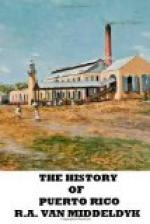Mr. Francisco del Valle Atiles, one of Puerto Rico’s distinguished literary men, has left us a circumstantial description of the character and conditions of these rustics.[62] He divides them into three groups: those living in the neighborhood of the large sugar and coffee estates, who earn their living working as peons; the second group comprises the small proprietors who cultivate their own patch of land, and the third, the comparatively well-to-do individuals or small proprietors who usually prefer to live as far as possible from the centers of population.
The jibaro, as a rule, is well formed, slender, of a delicate constitution, slow in his movements, taciturn, and of a sickly aspect. Occasionally, in the mountainous districts, one meets a man of advanced age still strong and robust doing daily work and mounting on horseback without effort. Such a one will generally be found to be of pure Spanish descent, and to have a numerous family of healthy, good-looking children, but the appearance of the average jibaro is as described. He looks sickly and anemic in consequence of the insufficient quantity and innutritious quality of the food on which he subsists and the unhealthy conditions of his surroundings. Rice, plantains, sweet potatoes, maize, yams, beans, and salted fish constitute his diet year in year out, and although there are Indian races who could thrive perhaps on such frugal fare, the effect of such a regime on individuals of the white race is loss of muscular energy and a consequent craving for stimulants.
His clothing, too, is scanty. He wears no shoes, and when drenched with rain or perspiration he will probably let his garments dry on his body. For the empty feeling in his stomach, the damp and the cold to which he is thus daily exposed, his antidotes are tobacco and rum, the first he chews and smokes. In the use of the second he seldom goes to the extent of intoxication.
Under these conditions, and considering his absolute ignorance and consequent neglect of the laws of hygiene, it is but natural that the Puerto Rican peasant should be subject to the ravages of paludal fever, one of the most dangerous of the endemic diseases of the tropics.
Friar Abbad observes: " ... No cure has yet been discovered (1781) for the intermittent fevers which are often from four to six years in duration. Those who happen to get rid of them recover very slowly; many remain weak and attenuated; the want of nutritious food and the climate conduce to one disease or another, so that those who escape the fever generally die of dropsy.”
However, the at first sight apathetic and weak jibaro, when roused to exertion or when stimulated by personal interest or passion, can display remarkable powers of endurance. Notwithstanding his reputation of being lazy, he will work ten or eleven hours a day if fairly remunerated. Under the Spanish regime, when he was forced to present himself on the plantations to work for a few cents from sunrise to sundown, he was slow; or if he was of the small proprietor class, he had to pay an enormous municipal tax on his scanty produce, so that it is very likely that he may often have preferred swinging in his hammock to laboring in the fields for the benefit of the municipal treasury.




